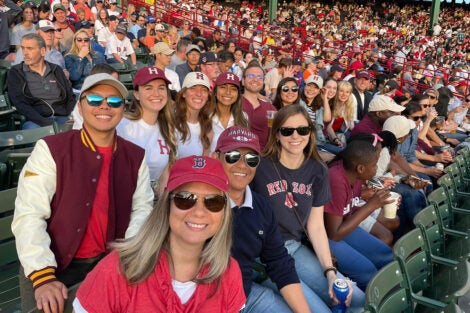November 8, 2023 – New classes at Harvard T.H. Chan School of Public Health typically begin with introductions, a syllabus review, and maybe an icebreaker to loosen the tension. But Simone Barry, MPH ’24, and her classmates found themselves doing downward dog.
The leader of their impromptu yoga class was John McDonough, Professor of the Practice of Public Health.
“I was so excited to meet and be taught by the person who was so [pivotal] in writing the Affordable Care Act. A guy who had dined with the Kennedys,” said Barry. “When—on the first day of the Public Health Policy and Politics class—[he told us] to stand and do a variety of yoga poses, I laughed like never before.”
Moments like this are what make the Master of Public Health in Epidemiology (MPH-EPI) program special. Most of the instruction is online and part-time, to allow students to work toward their degrees without interrupting their careers. But the program also includes three weeks of intensive instruction on campus during the summer, which allows students to grow their networks and deepen their relationships with faculty members and fellow students.
“I’m surprised that a predominantly online program has led to me forging such great relationships with my peers and faculty,” said Barry, a pulmonologist based in Australia.
Those relationships span the globe, too: On average, about two-thirds of MPH-EPI students hail from countries outside the U.S. In the program’s two current cohorts, 21 different countries are represented. Many of the students are researchers, doctors, or other medical professionals looking to gain new skills in biostatistics, epidemiology, and research methods to advance their careers.
Stefano Giannoni Luza, MPH ’24, a postdoctoral researcher based in Switzerland, said he chose the program because of its emphasis on research methods through a public health lens. He was pleasantly surprised by the level of interaction with fellow students and faculty, especially given the hybrid nature of the program.
Diane Brown, MPH ’24, a research collaborator at the Adolescent Childhood Experiences Lab at the University of California, Irvine, said that there is a lot of diversity in the program, but added, “What we all have in common is that we love to learn and have a genuine interest in knowledge. We support each other, work hard together, but manage to have fun, too.” She said that her cohort has great camaraderie, noting that she and her classmates plan to attend the wedding of two of their group members next year.
“We laugh, we tease,” she said. “We celebrate each other’s accomplishments, we salsa dance. And we truly enjoy each other’s company.”
Photo courtesy Maria Claros
